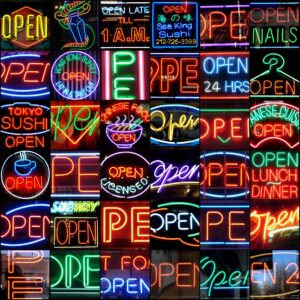
It is possible to go on and on and on defining terms in the field of open knowledge. It’s a big field! And a review of the literature will find many different attempts to define the same terms, with different definitions emphasizing different aspects of any given practice. I’ll focus here on three key terms—open, open educational resources, and open pedagogy—mainly to clarify the distinctions between open educational resources (OER) and open pedagogy.
Open & Open Educational Resources
The Open Knowledge Foundation defines open specifically as it is used in relation to open data and open content: “Open means anyone can freely access, use, modify, and share for any purpose (subject, at most, to requirements that preserve provenance and openness).” So, open content is content that anyone can freely access, use, modify, and share for any purpose.
Educational resources (e.g., textbooks, videos, podcasts, zines, whatever) are a type of content. So, applying the definition of open above, open educational resources are educational resources that anyone can freely access, use, modify, and share for any purpose.
Compare that definition of open educational resources with this very similar but more detailed definition from UNESCO: “Open Educational Resources (OER) are learning, teaching and research materials in any format and medium that reside in the public domain or are under copyright that have been released under an open license, that permit no-cost access, re-use, re-purpose, adaptation and redistribution by others.”
Open & Open Pedagogy
When used in relation to open pedagogy, the word open has a somewhat different meaning than it does above. Here, the word open isn’t defining a kind of thing (that is, data or content)—it’s defining a kind of practice.
What kinds of pedagogical practices are open? To answer this question, Robin DeRosa and Rajiv Jhangiani focus our attention on access, agency, and what they call a “commons-oriented approach to education” [emphases mine]. They describe open pedagogy “as an access-oriented commitment to learner-driven education AND as a process of designing architectures and using tools for learning that enable students to shape the public knowledge commons of which they are a part.”
This description (not really a definition) perhaps seems a little slippery, but remember that when we are talking about open pedagogy, we are talking about practices—what we do—rather than about things—what we use or make. When thinking about open pedagogy, you might ask yourself: What practices open up access to knowledge and learning? What practices center student agency? What practices enable students to contribute to the public knowledge commons—however you define that public, whether it be that of your classroom, the BMCC community, our city, or the entire world?